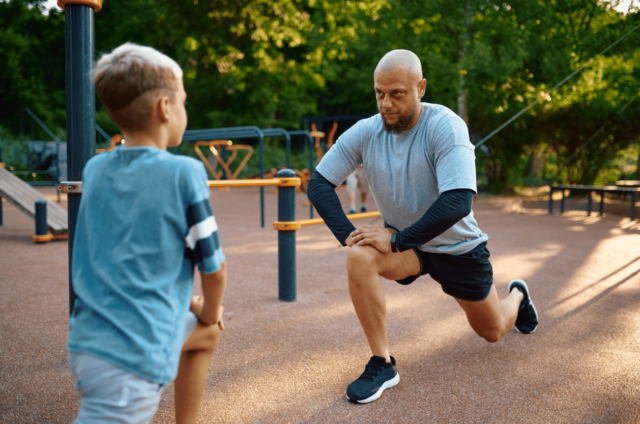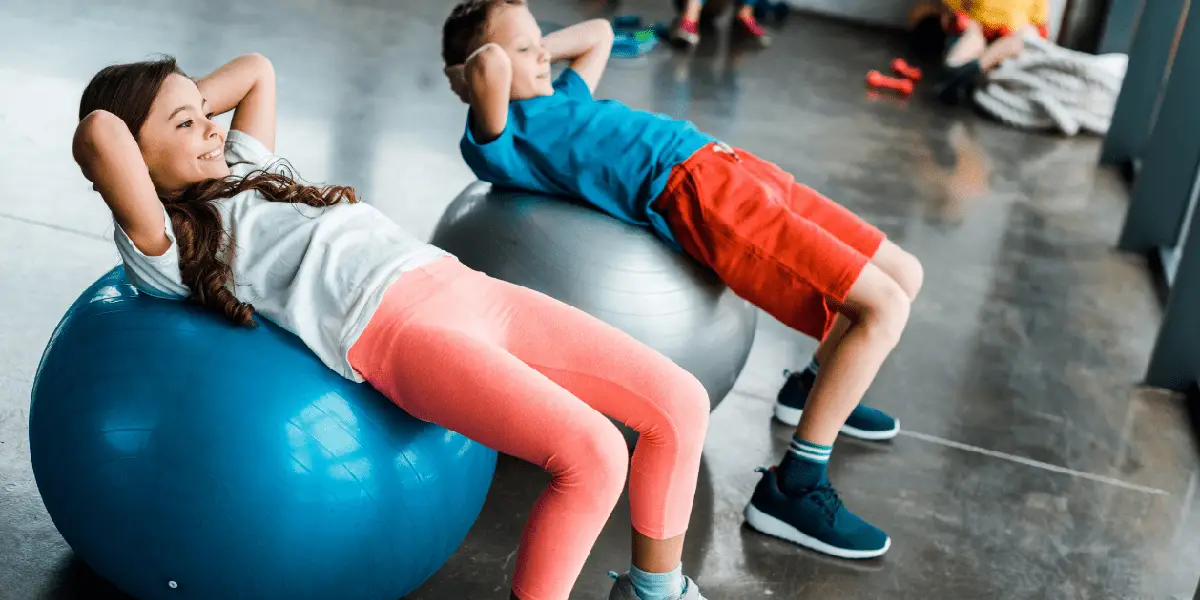What’s the proper age for kids to start exercising?
Exercise is an essential part of a healthy lifestyle, and it’s never too early to start instilling this habit in children. Engaging in physical activity from an early age not only promotes overall well-being but also establishes a foundation for a lifetime of fitness. However, determining the proper age to start exercising can be challenging for parents and caregivers. In this article, we will explore the benefits of exercise for kids, discuss what age they should start exercising, and provide guidance on establishing an exercise regimen and encouraging kids to enjoy physical activity.
Agenda:
What Age Should They Start Exercising?
Establishing an Exercise Regiment
Encouraging Kids to Enjoy Exercise
Best Types of Exercise for Kids
Advice for Safe Exercise Habits for Kids
The Role of Parents in Supporting Kids’ Exercise Habits
Top 5 Places Kids can Exercise in Charlotte NC

Benefits of Exercise for Kids
Engaging in regular physical activity offers numerous benefits for children’s physical and mental development. It helps strengthen their bones and muscles, improves cardiovascular health, and enhances flexibility and coordination. Exercise also aids in maintaining a healthy weight, reducing the risk of obesity and related conditions such as diabetes. Additionally, physical activity plays a crucial role in improving mood, reducing stress, and enhancing cognitive function.
When children participate in exercise, their bones become stronger and denser. This is especially important during childhood and adolescence when bone growth is at its peak.
Regular exercise helps to increase bone mineral density, reducing the risk of fractures and osteoporosis later in life.
Furthermore, exercise promotes the growth and development of muscles in children. As they engage in physical activities such as running, jumping, and climbing, their muscles are challenged and become stronger. Strong muscles not only support overall physical health but also improve posture and balance, reducing the risk of injuries.
Cardiovascular
Cardiovascular health is another significant benefit of exercise for kids. When children engage in activities that increase their heart rate, such as swimming or playing sports, their hearts become stronger and more efficient at pumping blood. This improves overall cardiovascular function and reduces the risk of heart disease later in life.
Mental Health
In addition to physical benefits, exercise also has a positive impact on mental health. Regular physical activity releases endorphins, which are natural mood boosters. This can help children feel happier and more relaxed, reducing symptoms of stress and anxiety. Exercise also improves sleep quality, allowing children to get the rest they need for optimal physical and mental development.
Moreover, exercise has been shown to enhance cognitive function in children. When kids engage in physical activities, blood flow to the brain increases, delivering oxygen and nutrients that support brain health. This can lead to improved concentration, memory, and overall academic performance.
It is important to note that exercise should be fun and age-appropriate for children. Encouraging activities that they enjoy, such as playing tag, riding bikes, or dancing, will make them more likely to engage in regular physical activity. Additionally, it is essential to provide a safe environment for children to exercise, ensuring proper supervision and appropriate protective gear.
In conclusion, the benefits of exercise for kids are vast and significant. From physical health improvements to mental well-being and cognitive enhancement, regular physical activity is crucial for children’s overall development. By encouraging and supporting their participation in exercise, we can help children lead healthier, happier lives.

What Age Should They Start Exercising?
While every child develops at their own pace, experts generally agree that children as young as three years old can start participating in age-appropriate physical activities. At this age, it is essential to focus on activities that promote gross motor skills, such as running, jumping, and throwing.
Engaging in physical activities from a young age not only helps children develop their motor skills but also contributes to their overall physical and mental well-being. Regular exercise can improve cardiovascular health, strengthen muscles and bones, enhance coordination and balance, and boost cognitive function.
Parents and caregivers play a crucial role in encouraging and facilitating exercise for young children. They can create a safe and stimulating environment that promotes physical activity. This can include setting up an outdoor play area with age-appropriate equipment, enrolling children in organized sports programs, or simply encouraging active playtime at home.
Sports
As children grow older, they can gradually engage in more complex exercises. Around the age of six or seven, they can start participating in organized sports such as soccer, basketball, or gymnastics. These activities not only provide physical benefits but also teach important life skills such as teamwork, discipline, and perseverance.
Strength Training
Strength training can also be introduced as children enter their preteen and teenage years. Under proper supervision and guidance, they can begin using resistance bands, light weights, or bodyweight exercises to build muscle strength. Strength training helps improve bone density, maintain a healthy weight, and prevent injuries.
Aerobic Activities
Aerobic activities, such as swimming, cycling, or dancing, are also highly beneficial for children of all ages. These activities increase heart rate, improve cardiovascular fitness, and help maintain a healthy weight. Additionally, aerobic exercises can boost mood, reduce stress, and improve sleep quality.
It is important to note that while exercise is crucial for children’s development, it should always be age-appropriate and safe. Parents and caregivers should consult with healthcare professionals or fitness experts to ensure that the chosen activities align with the child’s abilities and interests.
Starting exercise at a young age, around three years old, can have numerous physical, mental, and emotional benefits for children.
By gradually introducing age-appropriate activities, parents and caregivers can help children develop a lifelong love for physical fitness and set them on a path to a healthy and active lifestyle.
The appropriate age for kids to start exercising varies depending on their individual development and abilities. Here are some general guidelines:
Infants (0-1 year)
Infants should engage in natural movements such as rolling, crawling, and reaching, which are part of their normal physical development. Exercise at this stage is primarily about allowing them to explore their mobility and build foundational motor skills. There is no need for structured exercise programs.
Toddlers (1-3 years)
Toddlers can begin participating in active play, which includes activities like running, jumping, and playing with balls. These activities help improve their coordination and motor skills. Encourage playtime that involves movement and exploration.
Preschoolers (3-5 years)
Preschoolers can engage in more structured physical activities, such as age-appropriate sports, dance classes, or gymnastics. These activities help develop social skills, coordination, and a love for physical activity.n
Elementary School-Age Children (6-12 years)
At this stage, children should aim for at least one hour of moderate to vigorous physical activity each day. This can include playing sports, biking, swimming, or participating in organized physical activities. Strength training with appropriate guidance may also be introduced.
See Mission Grits Classes K-8th Grade – located in Charlotte NC.
Adolescents (13+ years)
Adolescents can transition into more regular and structured exercise routines. Strength training, aerobic exercises, and sports participation become more important. It’s essential to ensure proper guidance and supervision to prevent injuries during this stage.

Establishing an Exercise Regiment
To ensure children develop healthy exercise habits, it’s vital to establish a consistent exercise regimen. The key is to make physical activity fun and enjoyable. Incorporate a variety of activities that cater to your child’s interests and abilities. It can include jogging, biking, dancing, swimming, or playing team sports. Aim for at least 60 minutes of moderate to vigorous activity each day, but remember that any amount of physical activity is beneficial.
Jogging
When it comes to jogging, encourage your child to start with a brisk walk and gradually increase their pace. Running can be a great way to boost cardiovascular fitness and strengthen leg muscles. Consider exploring different routes in your neighborhood or local parks to keep things interesting.
Biking is another fantastic exercise option that can be enjoyed by children of all ages. Whether it’s a leisurely ride around the block or an adventurous trail ride, biking helps improve balance, coordination, and leg strength. Don’t forget to ensure your child wears a helmet and practices proper bike safety.
Dancing
Consider enrolling your child in dance classes or simply turn on some music at home and let them groove to the beat.
Dancing is a fun and creative way for children to get their bodies moving. Whether it’s ballet, hip-hop, or jazz, dancing helps improve flexibility, coordination, and rhythm.
Swimming is a low-impact exercise that provides a full-body workout. It’s a great option for children who may have joint or muscle limitations. Swimming helps improve cardiovascular endurance, muscle strength, and overall flexibility. Whether it’s at a local pool or the beach, swimming is a refreshing and enjoyable activity for children of all ages.
Team Sports
Team sports offer numerous benefits beyond physical fitness. They teach children valuable skills such as teamwork, communication, and sportsmanship. Whether it’s soccer, basketball, baseball, or any other team sport, encourage your child to participate and have fun. Consider joining community leagues or organizing friendly matches with friends and neighbors.
Remember, the goal is to make exercise a regular part of your child’s routine. Encourage them to engage in activities they enjoy, as it will increase their motivation and likelihood of sticking to a consistent exercise regimen. Be a positive role model by participating in physical activities with them and emphasizing the importance of an active lifestyle.
Lastly, it’s important to note that physical activity doesn’t have to be limited to structured exercise sessions. Encourage your child to engage in unstructured playtime, such as running around in the backyard, playing tag, or jumping rope. These spontaneous activities not only provide exercise but also foster creativity, imagination, and social interaction.

Encouraging Kids to Enjoy Exercise
One of the best ways to encourage kids to enjoy exercise is by leading by example. Engage in physical activity as a family and showcase the positive impact it has on your own well-being. Make it a point to provide a supportive and motivating environment that fosters a love for exercise. Encourage your child to explore different activities and find what they enjoy the most. Celebrate their achievements and offer praise for their efforts, reinforcing the importance of being active.
Physical activity is not only essential for maintaining a healthy weight, but it also plays a crucial role in a child’s overall development.
Regular exercise helps children build strong muscles and bones, improves their cardiovascular health, and enhances their coordination and balance.
Moreover, engaging in physical activity releases endorphins, which are known as the “feel-good” hormones, promoting a positive mood and reducing stress and anxiety.
When it comes to encouraging kids to enjoy exercise, it’s important to make it fun and exciting. Incorporate games and challenges into their physical activities to keep them engaged and motivated. Consider organizing a friendly family competition or joining community sports leagues where your child can interact with peers who share similar interests. By making exercise a social and enjoyable experience, your child is more likely to develop a lifelong love for being active.
Another effective way to encourage kids to enjoy exercise is by offering a variety of options. Children have different preferences and interests, so it’s essential to expose them to a range of physical activities. Take them swimming, biking, hiking, or even dancing. Let them try out different sports such as soccer, basketball, or martial arts. By allowing them to explore various activities, they can discover what they truly enjoy and feel passionate about.
As a parent, it’s crucial to be supportive and understanding of your child’s abilities and limitations. Avoid putting too much pressure on them to excel in a particular sport or activity. Instead, focus on their effort and progress, emphasizing the importance of staying active and having fun. Encourage them to set realistic goals and help them develop a sense of accomplishment when they achieve them.
In addition to physical activities, it’s important to educate children about the benefits of exercise. Teach them about the positive impact it has on their health, both now and in the future. Explain how exercise can improve their energy levels, boost their immune system, and enhance their cognitive function. By providing them with this knowledge, you empower them to make informed decisions about their own well-being.
Lastly, remember that consistency is key. Encourage your child to engage in regular physical activity, aiming for at least 60 minutes of moderate to vigorous exercise each day. Establish a routine that includes dedicated time for exercise, ensuring that it becomes a natural part of their daily lives. By making exercise a habit, your child will develop a strong foundation for a healthy and active lifestyle.

Best Types of Exercise for Kids
When it comes to choosing the best types of exercise for kids, it’s crucial to consider age-appropriateness and safety. Engaging in physical activities not only promotes a healthy lifestyle but also contributes to the overall development of children. Let’s explore some additional activities that are not only fun but also beneficial for kids.
Swimming
Swimming in Charlotte is a fantastic exercise option for children of all ages. Not only does it provide a full-body workout, but it also helps improve cardiovascular health and strengthens muscles. Additionally, swimming is a low-impact activity that reduces the risk of injury, making it an excellent choice for kids with joint or mobility issues.
Cycling
Cycling in Charlotte is another great exercise option for kids. It not only strengthens leg muscles but also improves balance and coordination. Riding a bike allows children to explore their surroundings and enjoy the outdoors while getting their heart rates up. Whether it’s a leisurely ride around the neighborhood or an adventurous trail, cycling is a fun activity that keeps kids active.
Martial arts, such as karate or taekwondo, offer numerous benefits for children. Apart from improving physical fitness, martial arts instill discipline, self-control, and respect. These activities teach kids valuable life skills while boosting their confidence and self-esteem. Martial arts also provide an opportunity for children to learn self-defense techniques, enhancing their overall safety.
Gymnastics
Gymnastics in Charlotte is an excellent choice for kids who enjoy flexibility, strength, and balance. This sport helps develop body control, agility, and coordination. Gymnastics classes often incorporate various apparatus, such as balance beams, uneven bars, and vaults, allowing children to learn new skills and challenge themselves. Moreover, participating in gymnastics fosters determination and perseverance.
Team Sports
Charlotte Team sports, such as soccer or basketball, are not only physically demanding but also promote teamwork and social interaction. Engaging in these activities helps children develop communication skills, learn how to work together, and build strong relationships with their teammates. Team sports also teach kids about sportsmanship, fair play, and the importance of cooperation.
Remember, it’s essential to choose activities that match your child’s interests and abilities. Encouraging them to participate in a variety of physical activities will not only keep them engaged but also help them discover their passions. Whether it’s swimming, cycling, martial arts, gymnastics, or team sports, the key is to make exercise enjoyable for kids so that they develop a lifelong love for staying active.

Advice for Safe Exercise Habits for Kids
While exercise is beneficial, safety should always be a top priority. To promote safe exercise habits for kids, ensure they have the appropriate gear and equipment for each activity. Provide proper instruction on warm-up exercises, stretching techniques, and proper form during specific movements. Emphasize the importance of staying hydrated and taking breaks when needed. Lastly, supervise younger children during physical activities to prevent accidents and provide assistance when necessary.

The Role of Parents in Supporting Kids’ Exercise Habits
Parents play a critical role in supporting and nurturing their children’s exercise habits. Apart from serving as role models, parents can actively participate in their child’s physical activities. This involvement can include organizing family-friendly fitness routines, enrolling them in sports programs or classes, and encouraging regular outdoor play. Additionally, parents should prioritize creating a supportive environment by providing positive reinforcement, setting achievable goals, and celebrating progress.

Top 5 Places Kids can Exercise in Charlotte NC
1. Mission Grit
Mission Grit offers after school programs and camps that focus on physical, mental, social, and character development in Charlotte, NC. Ages are K thru 8th grad.
Interested? Book a trial class.
2. Mecklenburg County Parks
Mecklenburg County boasts a wide array of parks, including Freedom Park and Reedy Creek Park. These parks offer playgrounds, sports fields, walking trails, and green spaces for kids to enjoy various physical activities.
3. YMCA Charlotte
The YMCA has multiple branches across Charlotte, providing youth fitness programs, swimming pools, sports leagues, and organized activities designed to keep kids active and healthy.
4. Sports Connection
Sports Connection is a family-friendly facility offers kids a chance to engage in a variety of sports, including indoor soccer, basketball, and laser tag. It’s an ideal place for active play and organized sports activities.
5. Discovery Place Nature
Located in Freedom Park, Discovery Place Nature provides an educational and active experience for children. They can explore nature trails, learn about local wildlife, and participate in interactive exhibits that promote physical engagement.
Conclusion
In conclusion, the proper age for kids to start exercising is as early as three years old, focusing on age-appropriate activities that develop gross motor skills. Establishing a consistent exercise regimen, encouraging enjoyment of physical activity, and providing a safe and supportive environment are essential for fostering long-lasting fitness habits. Remember, the journey towards a healthy lifestyle starts at a young age, so let’s inspire our children to embrace the joy of staying activ



